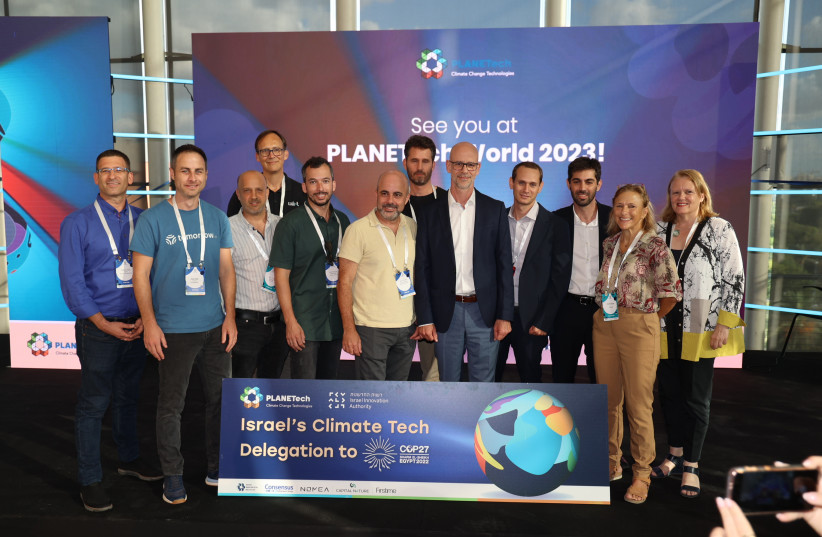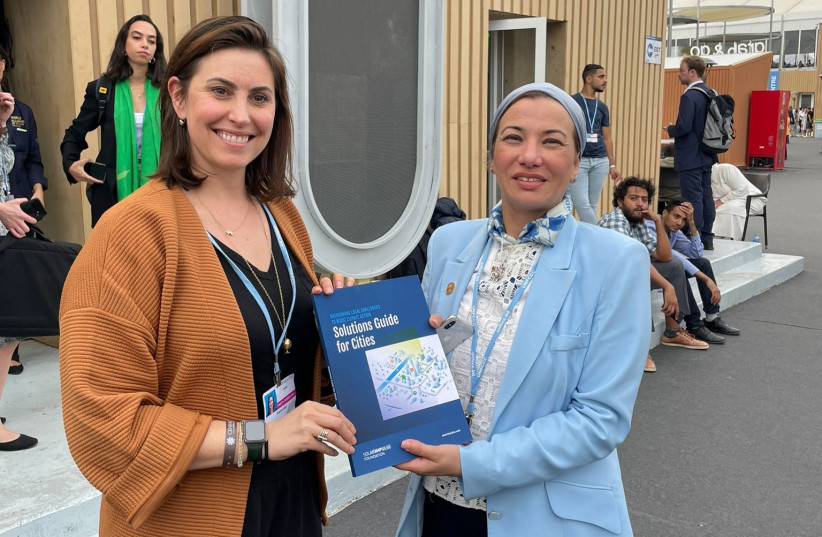For the first time, a delegation from Israel representing the nation’s climate-tech innovations and its advancements in the field attended the COP27.
Published: NOVEMBER 20, 2022

(photo credit: PERRY MENDELBOYM)
The United Nations annual Climate Change Conference (COP27) in Sharm El Sheikh, Egypt came to a close last week, concluding two weeks of dialogue, information sharing and innovation surrounding one of the central issues in the international arena: climate change.
In attendance this year, for the first time, was a delegation from Israel representing the nation’s climate-tech innovations and its advancements in the field. H2Pro, GenCell, Remilk, Aleph Farms, Groundwork BioAg, Tomorrow.io, Beewise, UBQ Materials, HomeBiogas and Wiliot displayed their products at the Israeli booth during the open event and participated in key discussions that drove forward the narrative of using technology in order to combat the ongoing climate crisis.
While at the conference, renewable plastic solution UBQ’s VP of sustainability Rachel Barr noted that while the 10 chosen start-ups were surely selected due to their merit and potential for impact on a global scale, she was consistently impressed by the potential she saw from all of the attending companies who weren’t chosen to participate as part of the Israeli delegation, as well.
“I am in awe of what’s happening. We’re very fortunate to be counted amongst the cream of the crop; however, I would imagine that you could cut the number [of participating start-ups] at the top quadrant and perhaps be equally as impressed in terms of the potential once they grow,” she said.
“The opportunities for technology, start-ups and innovation to deliver solutions on climate are only as limited as our imagination and the ability to find funding. This is the biggest challenge of our time. If we fail to rise to the occasion there will be massive war, hunger and migration,”UBQ’s VP of sustanability Rachel Barr
UBQ’s VP of sustainability Rachel Barr (left) with the Egyptian Environment Minister at COP27 (right) (credit: UBQ MATERIALS)
“The opportunities for technology, start-ups and innovation to deliver solutions on climate are only as limited as our imagination and the ability to find funding. This is the biggest challenge of our time. If we fail to rise to the occasion there will be massive war, hunger and migration,” Barr noted.
She then explained further, saying “I don’t see other countries like Singapore, like the US — countries that are known for innovation — delivering on the climate-tech Call to Action like Israel is. And I don’t know why that is.”
She suggested that Israel’s tech-forward ecosystem is generating a lot of effort toward finding climate solutions, which could be what’s giving it a leg up in the climate-tech department. Whatever the case may be, she said, “This is a small country where things are really happening.”
Despite all of the potential that Barr has seen, she noted that she still feels a growing sense of concern that things aren’t moving quickly enough. “It’s getting very hot. I’m getting scared. There are mass fires,” she said. “I think people are seeing the reality of climate change is no longer just as hypothetical as it was, to some extent, 10 years ago. When I came into this business to advance sustainability and advance international cooperation, I was laughed at. No longer is that the case.”
GenCell could make moves in Egypt
During the conference, energy solution start-up GenCell leveraged the opportunity at COP27 to reinforce its ongoing collaboration with the key leaders of Hydrogen Europe, the leading hydrogen and fuel cell association for European-based companies, and the African Hydrogen Partnership (AHP), the only continent-wide African umbrella association solely dedicated to the development of green hydrogen and fuel cell technology.
The company also took the opportunity to meet with Hydrogen Egypt, with whom the company is exploring opportunities in its Southern neighbor to leverage hydrogen fuel cell technologies for clean power in locations beyond the grid.
DeserTech aims to support water-scarce countries around the world
The DeserTech Community presented at the conference, showcasing the Negev’s vibrant tech innovation ecosystem containing dozens of startups, leading academic and research institutes, technological accelerators and desert farmers.
“DeserTech promotes regional cooperation with many countries, sharing practical and technological solutions to the climate crisis and seeking to position the Israeli Negev at the forefront of the global effort to combat and adapt to desertification,” said Sivan Cohen-Shahari, director of the DeserTech Community.
“DeserTech promotes regional cooperation with many countries, sharing practical and technological solutions to the climate crisis and seeking to position the Israeli Negev at the forefront of the global effort to combat and adapt to desertification,”Sivan Cohen-Shahari, director of the DeserTech Community
“As part of our participation in the COP27 climate conference, we seek to offer the advantages of the Negev to countries around the world currently dealing with extreme climates, soil erosion and acute water shortages — and no less so to countries that will face these challenges in the coming years,” she said.
https://www.jpost.com/environment-and-climate-change/article-722893

